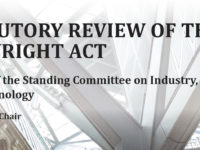Earlier this year, Innovation, Science and Economic Development Minister Navdeep Bains sent shockwaves through the Canadian telecom industry by unveiling a proposed new policy direction to the CRTC based on competition, affordability, consumer interests, and innovation (my original post on the proposed direction here, podcast with Teksavvy’s Andy-Kaplan Myrth here). The big three telecom providers unsurprisingly objected to the government’s shift away from facilities-based competition toward a broader approach that welcomed all forms of competition. That shift signalled support for entry of new competitors such as mobile virtual network operators (MVNOs), a signal that the CRTC understood with its new-found support for them.
Latest Posts
Process Failure: Why the Copyright Review Was Right To Ignore the Canadian Heritage Committee Study, Part One
The release of the much-anticipated copyright review report from the Standing Committee on Industry, Science and Technology has sparked a range of reactions. From UNEQ’s “the committee despises creators” to Canadian Music Publishers Association’s “disappointing“, some groups would clearly prefer that the government pay attention to the one-sided Canadian Heritage study instead. In fact, the report makes it clear that the committee did not read the Heritage study, as the committee thanked its colleagues and noted that it “looks forward to consulting their report.”
That approach angered Heritage committee member Pierre Nantel, who moved a motion that the committee “express its dismay” that its report was ignored. At this stage, it does not appear that the committee will consider Nantel’s motion as no further meetings are planned before the House of Commons breaks for the summer and then dissolves with the fall election.
The LawBytes Podcast, Episode 16: The Copyright Review Report – Carys Craig on the Roadmap for the Future of Canadian Copyright Law
In December 2017, the Canadian government launched its much-anticipated and much-lobbied review of Canadian copyright law, tasking the Standing Committee on Industry, Science and Technology to lead the way. After months of study and hundreds of witnesses and briefs, the committee released its authoritative report with 36 recommendations earlier this month. Carys Craig, a law professor at Osgoode Hall Law School and one of Canada’s leading copyright law experts, joins the podcast to help sort through the report and to consider what it means for the future of Canadian copyright law.
Message Received: Why Unlimited Wireless Plans Show Government’s Emphasis on New Competition is Being Heard
Long available in other countries, “unlimited” wireless plans arrived among the big three carriers in Canada yesterday with Rogers launching new unlimited options that offer 10 GB of data at full speed and unlimited additional data at a far slower speeds of 256Kbps. While some criticize the throttled overage speeds or the inferiority of the Canadian plans when compared to what is available in the U.S., this is a good step for consumers that ration their data each month in fear of incurring significant overage charges. Indeed, the comparative data shows Canadian consumers use less data than consumers elsewhere, particularly subscribers with Rogers, Bell, and Telus. Moreover, with carriers generating more than $1 billion per year in overage fees, the change is not trivial with some analysts characterizing the move as a negative for Canada’s wireless industry.
Super-Secret Submissions: Corus and SaskTel Block Disclosure of Their BTLR Submissions Claiming Prejudice to Their Competitive Position
Over the past few weeks, I’ve been posting several of the more notable submissions to the Broadcast and Telecommunications Legislative Review Panel submissions that were previously not released to the public. These included Bell, Shaw, Cogeco, Quebecor, CWTA, and a Rogers submission that was released months after the submission deadline. The Access to Information office at Minister Navdeep Bains’ ISED has now completed the request and says it cannot disclose submissions from Corus and SaskTel. Both companies are apparently taking the position that they can withhold disclosure of their submissions on competitive grounds, citing Section 20(1)(c) of the Act:











